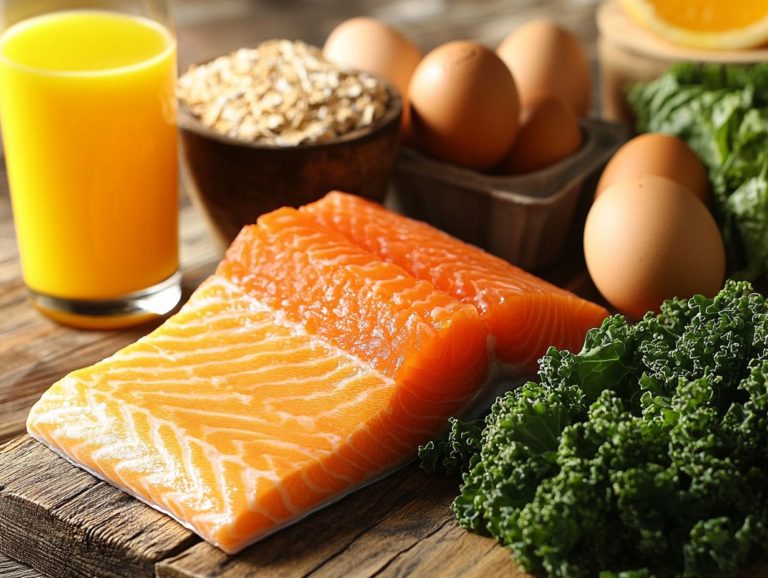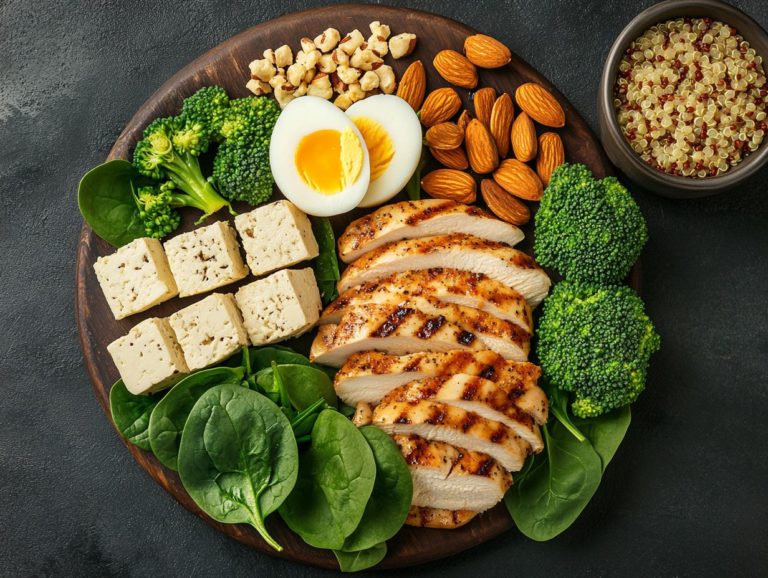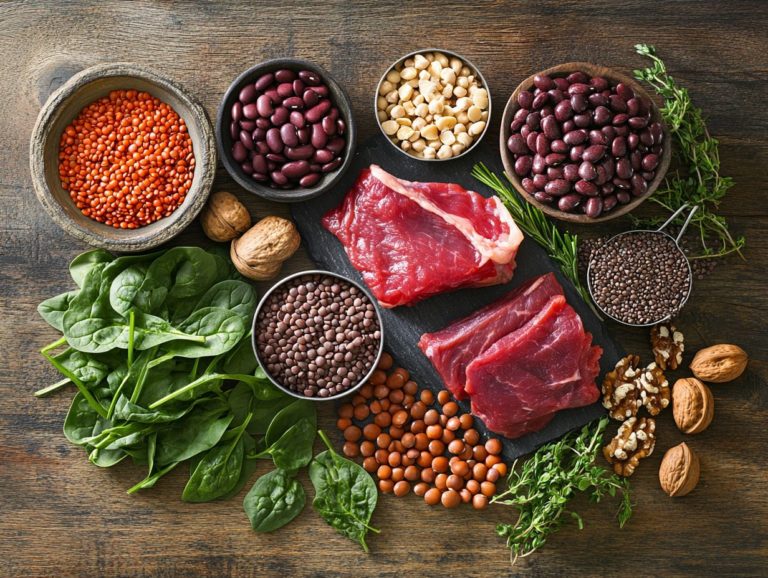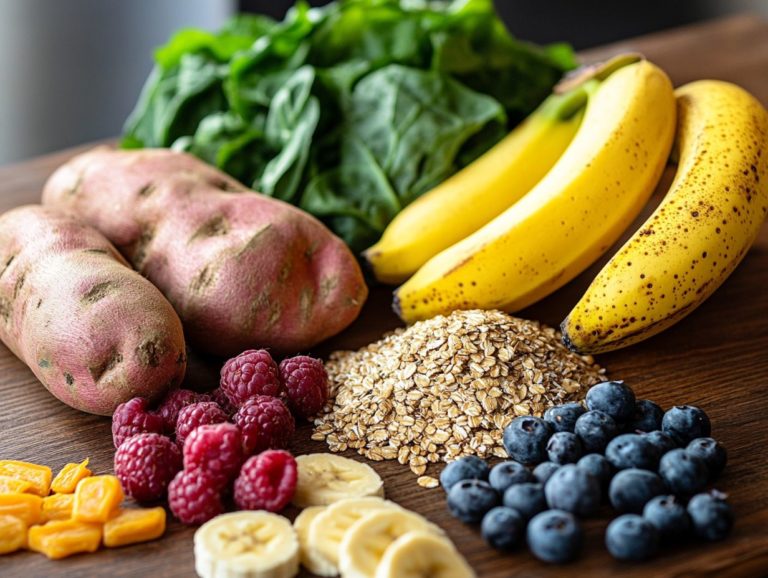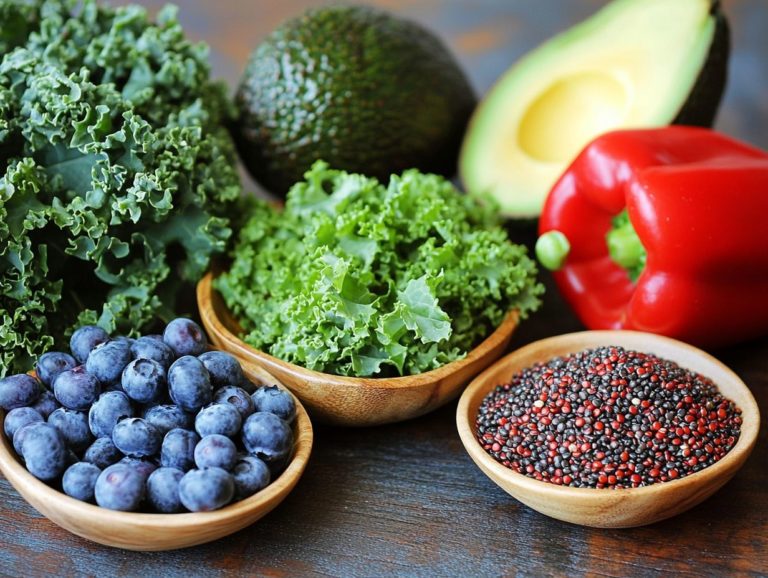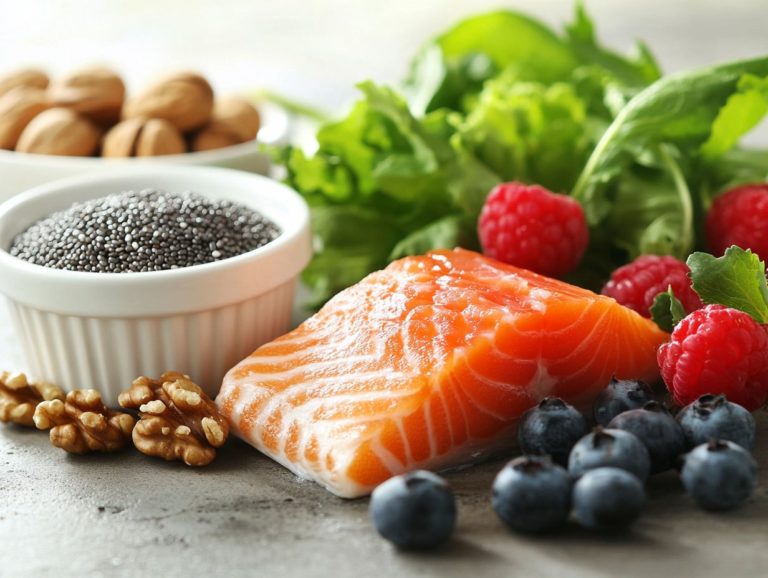Top 10 Food Sources of Folate for Pregnant Women
Folate is an essential nutrient for you during pregnancy, playing a vital role in your baby’s development and your overall health.
Let s dive into the top 10 delicious foods packed with folate that will support your pregnancy journey! From vibrant dark leafy greens to creamy avocados, these foods not only enhance your folate intake but are also brimming with other essential nutrients.
You ll also find information on recommended intake levels, potential risks, and tips to optimize your folate consumption. Dive in to explore how you can nourish both yourself and your growing baby!
Contents
- Key Takeaways:
- 1. Dark Leafy Greens
- 2. Beans and Lentils
- 3. Avocado
- 4. Broccoli
- 5. Asparagus
- 6. Citrus Fruits
- 7. Fortified Cereals
- 8. Brussels Sprouts
- 9. Sunflower Seeds
- 10. Beets
- Why Is Folate Important for Pregnant Women?
- What Are the Recommended Daily Intake Levels for Folate During Pregnancy?
- Are There Any Risks Associated with Consuming Too Much Folate During Pregnancy?
- How Can a Pregnant Woman Ensure They Are Getting Enough Folate in Their Diet?
- What Are Some Other Nutrients That Can Help Support a Healthy Pregnancy?
- Can Folate Supplements Be Used Instead of Dietary Sources?
Key Takeaways:
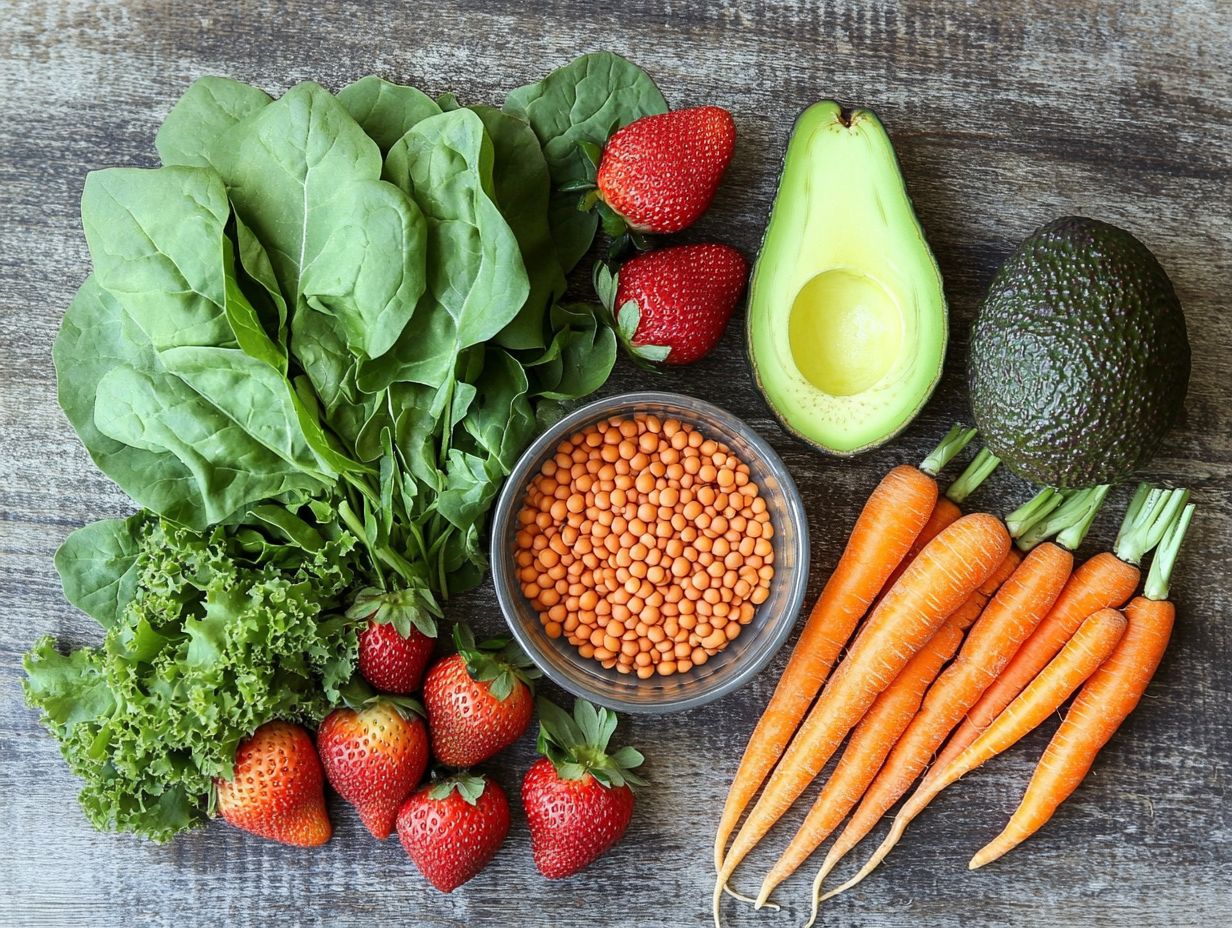
- Don t miss out on these fantastic folate sources: dark leafy greens, beans, lentils, avocado, broccoli, and asparagus!
- It is recommended for pregnant women to consume at least 600 mcg of folate daily to support a healthy pregnancy.
- While folate is important, too much can have adverse effects, so it is essential to follow recommended intake levels.
1. Dark Leafy Greens
Dark leafy greens, like spinach and broccoli, are your go-to powerhouses of folate, also known as vitamin B9. This nutrient is crucial for maintaining optimal folate levels and preventing deficiencies, especially for pregnant women and those at risk of a type of anemia caused by folate deficiency.
These greens pack a punch, typically containing between 200 to 400 micrograms of folate per 100 grams. This makes them essential for anyone looking to meet the daily recommended intake of 400 micrograms for adults.
Your body efficiently absorbs folate from these sources, largely thanks to the presence of complementary nutrients like vitamin C.
Incorporate a variety of dark leafy greens into your daily meals. They support cellular health and DNA synthesis, enhancing vital health benefits such as improved mood and cognitive function.
Adding these nutrient-rich foods to your plate can significantly elevate your overall nutritional status.
2. Beans and Lentils
Beans and lentils are outstanding sources of folate, making them essential components of a healthy diet, especially if you’re looking to boost your intake of this vital nutrient.
These legumes are brimming with vitamins, minerals, and fiber. They play a pivotal role in enhancing heart health and promoting digestive regularity.
Incorporating beans and lentils into your meals is straightforward and incredibly versatile. Toss them into salads, blend them into soups, or use them as a hearty filling for wraps and casseroles.
For those following vegetarian or vegan diets, these nutrient-rich foods become a go-to protein source, helping you balance your nutrient intake while fostering overall health and wellness.
3. Avocado
Avocado, that creamy and incredibly versatile fruit, is a powerhouse of folate and offers a wealth of health benefits. It is an ideal addition to your healthy diet focused on optimal nutrient intake.
Rich in healthy monounsaturated fats, avocados deliver essential fatty acids that bolster heart health. They also provide significant amounts of potassium, vitamin E, and vitamin K.
Including avocados in your daily meals is delightful. You can mash them into spreads, slice them onto salads, or blend them into smoothies.
By incorporating this nutrient-dense fruit into your diet, you can elevate your overall dietary quality, ensuring a balanced intake of vital vitamins, minerals, and antioxidants that contribute to your long-term well-being.
Start adding these folate-rich foods to your meals today for a healthier pregnancy!
4. Broccoli
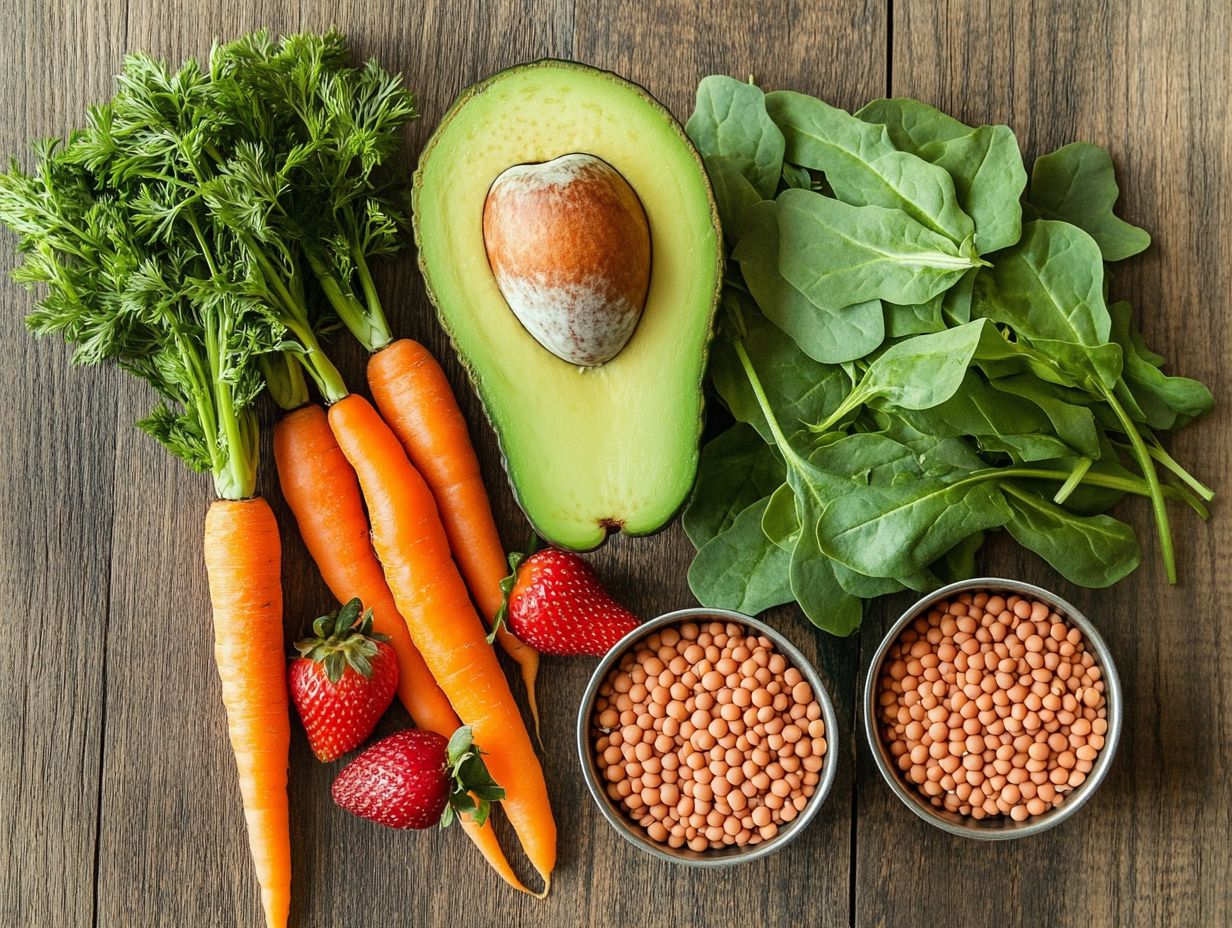
Broccoli isn t just a tasty vegetable; it s an excellent source of folate with numerous health benefits vital for your body, especially for those at risk of nutrient deficiencies.
This leafy green is nutrient-rich, packed with a variety of vitamins, minerals, and dietary fiber. Its high folate content is essential for the body s process of making new cells, making it crucial in preventing birth defects and supporting overall health.
Incorporating broccoli into your meals is simple and effective. Steam it, roast it, or toss it into salads and stir-fries it easily fits into your culinary repertoire.
Make sure to include broccoli in your meals regularly to boost your folate levels and improve your health!
5. Asparagus
Asparagus is rich in nutrition, providing a significant dose of folate that enhances your diet and supports overall health.
This vegetable meets your body s folate needs, which are crucial for making and repairing DNA. It also helps maintain healthy homocysteine levels, reducing the risk of cardiovascular diseases.
Its impressive fiber content promotes digestive health, ensures regular bowel movements, and nurtures a thriving gut microbiome. By adding this versatile vegetable to your daily meals, you can enjoy a wide range of vitamins and minerals while benefiting from its many health advantages.
6. Citrus Fruits
Citrus fruits like oranges and grapefruits deliver a delightful burst of flavor and a significant amount of folate, making them excellent additions to a balanced diet.
Lemons and limes also contribute to your folate intake, each offering unique flavors that can enhance various dishes.
Folate plays a vital role in cell division and DNA production, especially for those who are pregnant or planning to conceive.
Here are some tasty ways to enjoy citrus fruits in your meals:
- Add orange segments to a colorful salad.
- Drizzle lemon juice over grilled vegetables.
- Savor a refreshing grapefruit as part of your breakfast.
These enhancements boost flavor and elevate the nutritional value of your everyday meals, laying the groundwork for a healthier lifestyle.
7. Fortified Cereals
Fortified cereals offer a convenient way to help you get enough folate, which is particularly important for vulnerable populations.
This is especially vital for groups at higher risk, like pregnant women, who need increased folate for fetal development and to minimize the risk of neural tube defects.
If you have malabsorptive disorders, getting enough nutrients can be challenging, making fortified cereals an invaluable resource.
Many breakfast cereals are enriched with folic acid, providing an effortless nutritional boost. By incorporating these cereals into a balanced diet, you can maintain your overall health and well-being, ensuring you access the vital nutrients necessary for optimal functioning.
8. Brussels Sprouts
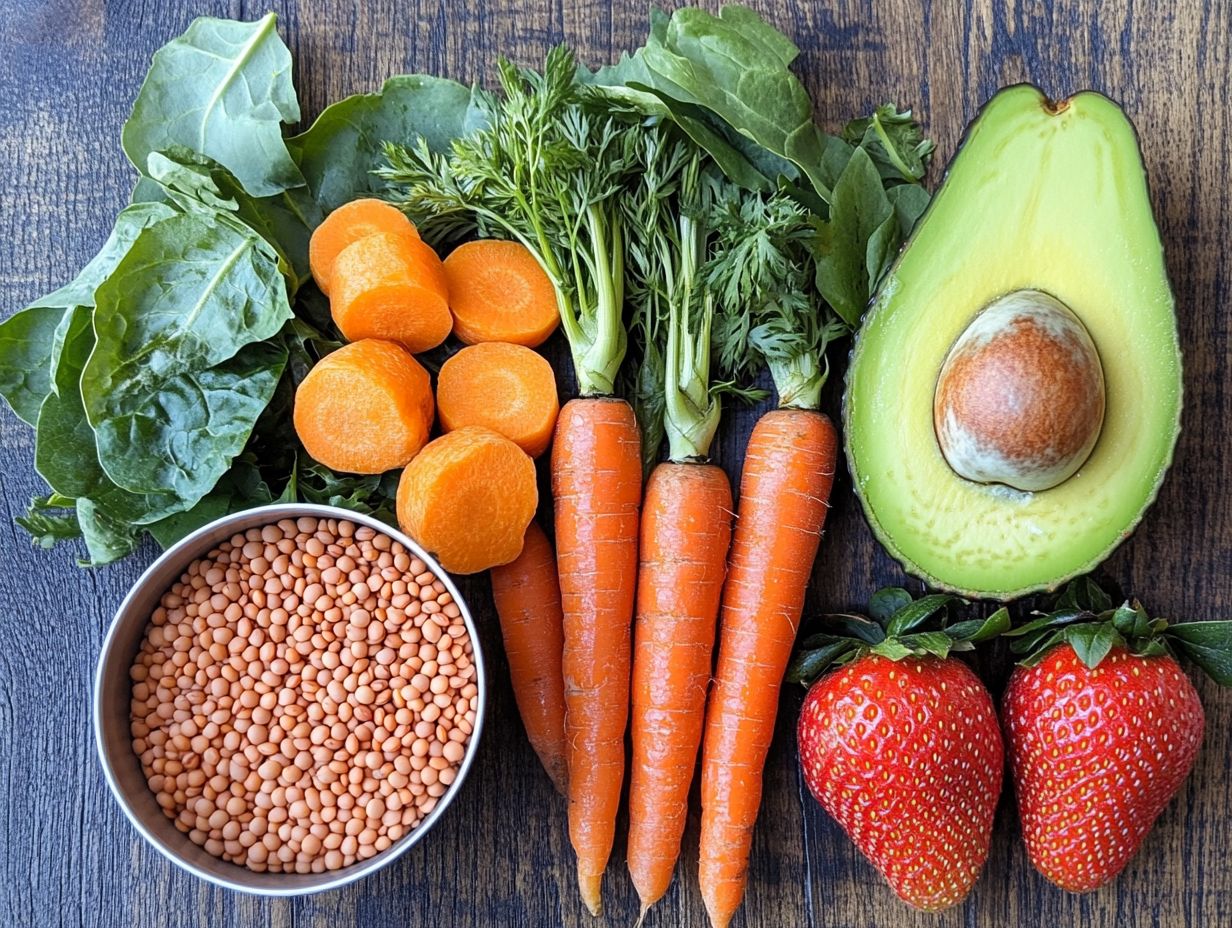
Brussels sprouts are nutrient-rich foods. They are an exceptional source of folate, which is essential for your health.
These little green gems are also rich in antioxidants and fiber. They support heart health and aid digestion.
With their subtly nutty flavor, Brussels sprouts fit into various dishes. You can roast them with olive oil, saut them with garlic, or toss them into salads for a delightful crunch.
Including Brussels sprouts in your diet can elevate your nutrient intake and promote your well-being.
9. Sunflower Seeds
Sunflower seeds are a delicious and nutritious snack. They offer a generous dose of folate, boosting your overall health.
Enjoying sunflower seeds can support your heart health and increase your energy levels. They can even help elevate your mood.
Incorporating sunflower seeds into your meals is easy. Sprinkle them on salads, blend them into smoothies, or enjoy them on their own.
Mix them into trail mixes, add them to baked goods, or use them as a crunchy topping for various dishes.
10. Beets
Beets are a vibrant addition to your plate. They are full of folate and offer many health benefits.
This tasty root vegetable delivers an earthy flavor and an impressive nutritional profile. It s a great choice for boosting your folate intake.
Adding beets to your meals is simple and fun. You can roast them, blend them into smoothies, or pickle them for a tangy snack.
Beets can elevate salads, soups, and side dishes. You can easily boost your dietary intake while enjoying their unique taste.
Why Is Folate Important for Pregnant Women?
Folate is vital for your health during pregnancy. It plays a critical role in fetal development and lowers the risk of neural tube defects.
This powerful B-vitamin is key for proper cell division, which is the process cells go through to grow and divide. Adequate folate can help prevent complications like preterm birth.
As an expecting mother, be mindful of your folate levels. Incorporate rich dietary sources like:
- Leafy greens
- Legumes
- Enriched grains
Consider supplementation if needed. Supporting folate intake not only benefits fetal health but also makes for a smoother pregnancy journey. By focusing on your folate intake, you can ensure a healthy start for your baby.
What Are the Recommended Daily Intake Levels for Folate During Pregnancy?
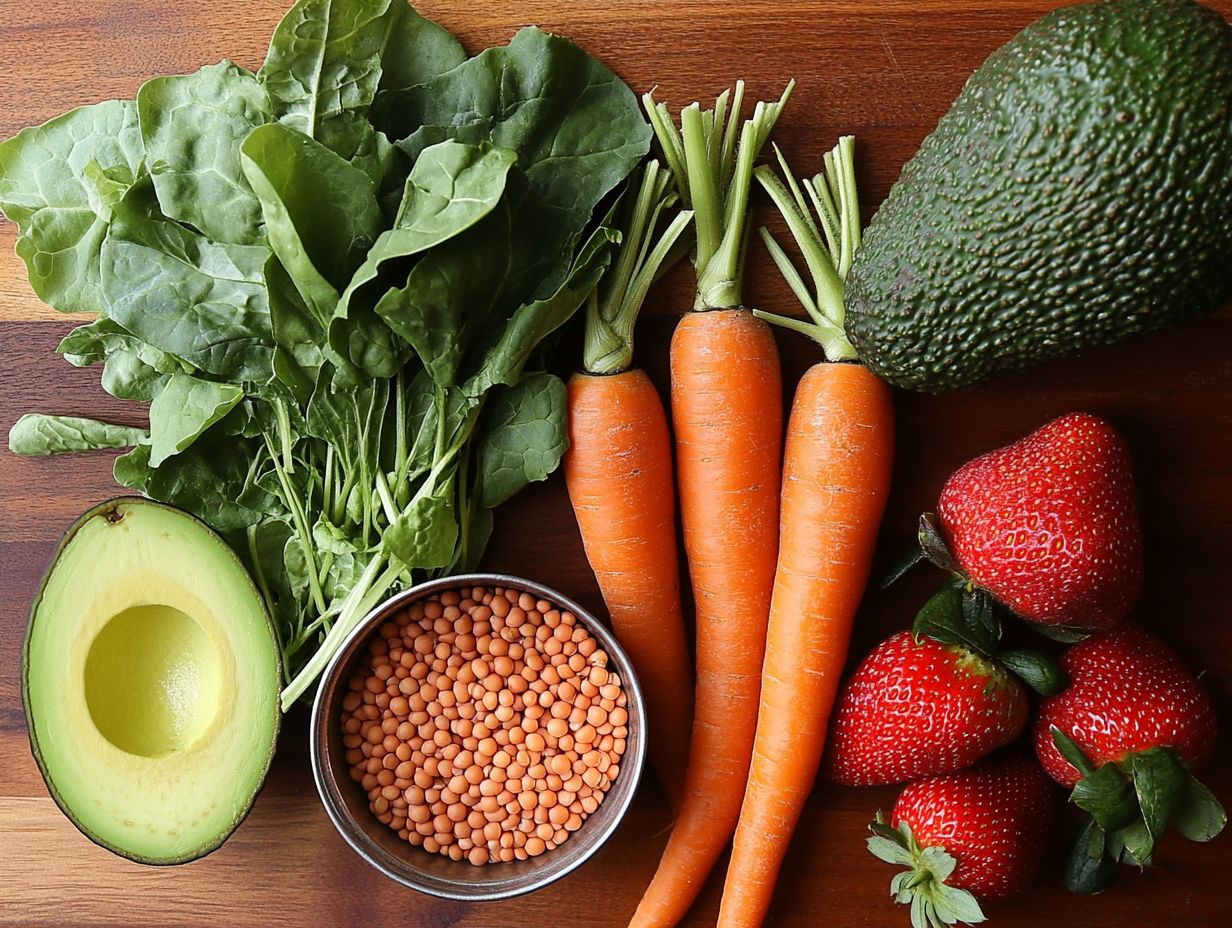
The recommended daily intake levels for folate during pregnancy are crucial for your health. You will need more folate than those who are not pregnant.
If you are pregnant, aim for around 600 micrograms of folate each day. This is a significant increase from the 400 micrograms recommended for non-pregnant individuals.
Understanding these values is important for your health. Adequate folate intake can greatly reduce the risk of neural tube defects, which develop into your baby’s brain and spine.
Following these guidelines promotes a healthy pregnancy and highlights the importance of preconception health awareness.
Are There Any Risks Associated with Consuming Too Much Folate During Pregnancy?
Folate is essential during pregnancy, but too much can be risky. It might mask a vitamin B12 deficiency, so health professionals should monitor your intake.
Excessive folate can also lead to complications, such as neurological issues and increased allergies in your developing baby.
As an expecting mother, you must find the right balance between fulfilling your nutritional needs and avoiding over-supplementation. Health professionals can provide guidance on appropriate folate dosages and educate you about the importance of a well-rounded diet rich in whole foods.
This approach ensures you enjoy the benefits of folate without the risks of excessive intake.
How Can a Pregnant Woman Ensure They Are Getting Enough Folate in Their Diet?
To get enough folate, focus on folate-rich foods and consider prenatal vitamins. A well-structured meal plan can help you reach your folate goals.
Include a variety of fruits, leafy greens, legumes, and fortified cereals in your diet. This variety will satisfy your cravings and nutritional needs.
Preparing meals in advance can make accessing these nutrients easier, especially on busy days. Prenatal vitamins can provide that extra boost to fill any nutritional gaps for you and your baby.
What Are Some Other Nutrients That Can Help Support a Healthy Pregnancy?
Besides folate, other nutrients such as vitamin B12, iron, and omega-3 fatty acids are vital for a healthy pregnancy. Balanced dietary recommendations are essential during this time.
These nutrients work together to enhance your maternal health and ensure optimal fetal development. Vitamin B12 supports neurological growth, while iron helps prevent anemia by accommodating your increased blood volume.
Omega-3 fatty acids are known for their anti-inflammatory benefits and are crucial for brain development in your growing baby.
To incorporate these nutrients, consume a variety of animal products like meat, dairy, and fish, along with fortified cereals for vitamin B12. Increase your intake of leafy greens, legumes, and nuts for iron, and include fatty fish like salmon for omega-3s.
If dietary adjustments are challenging, prenatal supplements can be a valuable resource to help bridge nutrient gaps.
Can Folate Supplements Be Used Instead of Dietary Sources?
Folate supplements can be an excellent alternative if you’re finding it difficult to meet your folate requirements through food alone. Approaching them wisely can lead to incredible health benefits!
This is particularly relevant for specific groups, such as pregnant women, individuals who have trouble absorbing nutrients from food, or those following restrictive diets.
While supplements can effectively bridge nutritional gaps, it’s essential to strike a balance with whole food sources rich in folate like leafy greens and legumes. This balance helps maximize health benefits.
Consulting with healthcare professionals offers tailored guidance. This ensures any supplementation aligns with your unique health needs and lifestyle choices, leading you toward a more holistic approach to wellness.
Frequently Asked Questions
What are the top 10 food sources of folate for pregnant women?
- Leafy green vegetables
- Legumes
- Citrus fruits
- Avocado
- Broccoli
- Fortified grains and cereals
- Asparagus
- Brussels sprouts
- Beets
- Nuts
Why is folate important for pregnant women?
Folate is crucial for pregnant women because it supports the development of the baby’s neural tube, which becomes the baby’s brain and spinal cord.
How much folate should a pregnant woman consume per day?
A pregnant woman should consume at least 600 micrograms of folate per day. For optimal health of the baby, it is recommended to consume 800 micrograms.
Can I get enough folate from supplements?
While supplements can provide a good source of folate, it’s best to obtain it through a balanced diet for other essential nutrients as well.
Are there any risks associated with consuming too much folate during pregnancy?
Too much folate during pregnancy can mask a vitamin B12 deficiency, potentially leading to nerve damage. Always consult with a healthcare provider before taking any supplements.
What are the consequences of not consuming enough folate during pregnancy?
Not consuming enough folate can increase the risk of birth defects, such as spina bifida or other neural tube defects in the baby.

